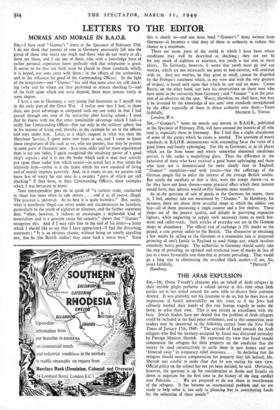LETTERS TO THE EDITOR
MORALS AND MORALE IN B.A.O.R.
have read " Gunner's " letter in the Spectator of February 25th. I do not think that parents of sons in Germany necessarily fall into the group of those who worry too much and those who do not worry at all ; there are those, and I am one of them, who with a knowledge born of earlier personal experience know perfectly well that temptation is great. It seems to me that our faith must be placed in those standards which, it is hoped, our sons carry with them ; in the efforts of the authorities, and in the influence for good of the Commanding Officers. In the light of the temptation—and " Gunner " has said that some areas are still shock- ing (why and by whom are they permitted to remain shocking ?)—and of the faith upon which one must depend, there must remain worry in some degree.
I have a son in Germany, a very young 2nd lieutenant as I myself was in the early part of the Great War. I realise now that I had, in those days, one great advantage as compared with my son today in that I had passed through one year of the university after leaving school ; I trust that he shares with me that other inestimable advantage which I had—a really fine Commanding Officer—fine not only in the military sphere but in his manner of living and, thereby, in the example he set to the officers and men under him. Later, as a ship's surgeon in what was then the Merchant Service, I spent some two years at sea, and I came to know those temptations of life such as we, who are parents, fear may be present in some parts of Germany now. -As a man, older and far more experienced than is my son today, I again recognised the steadying power of a good ship's captain ; and it is not the brake which such a man may actively put upon those under him which counts—in actual fact it may count for relatively little—rather is it the brake which his own standard of living and of morals imposes passively. And, so it seems to me, we parents will know less of worry for our sons in a country " parts of which are still shocking " if they have, in their Commanding Officers, those examples which I was fortunate to know.
Your correspondent goes on to speak of " a curious trade, conducted in shops but more often in side streets . . . and it is, of course, illegal. The practice is universal. At its best it is quite harmless." But, surely, what is manifestly illegal can never under any circumstances be harmless, particularly to the youth of eighteen or nineteen, and the further statement that, " often, however, it induces or encourages a deplorable kind of materialism and is a genuine cause for concern," shows that " Gunner " recognises this. And if I may take him to the end of his letter—a letter which I should like to say that I have appreciated—I fmd the disturbing statement ; " It is an obvious chance, without being an utterly appalling one, that he (the British soldier) may come back a worse man." Since
this is clearly so—and one must heed " Gunner's " letter written from Germany—it becomes a vital duty of those in authority to reduce this chance to a minimum.
There are many parts of the world to which I have been where conditions may well be described as shocking ; they are not fit for any youth of , eighteen or nineteen, but youth is not sent to these places. To Germany, however, it seems that youth must go and our worries, which are not necessarily too great or non-existent, will continue with us. And our worries, be they great or small, cannot be dispelled by the Primate's statement which, in my view and with the very greatest of respect, is based only upon that which he saw and no more. Canon
Raven, on the other hand, can base his observations on those men who have come to the university from Germany ; and " Gunner " is in the posi- tion of an observer on the spot. Worry, therefore, we shall have, but may it be lessened by the knowledge of our.sons' own standards strengthened by the effort especially of those in direct authority over them.—Yours






































 Previous page
Previous page